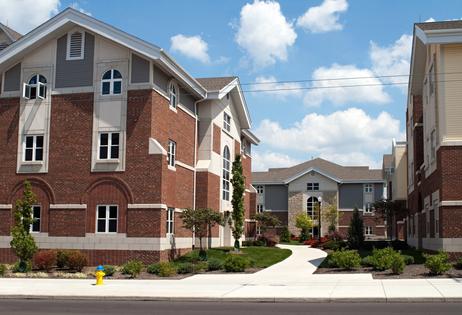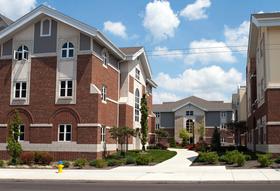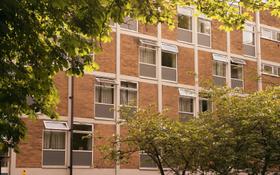Many people who enter college become preoccupied with having an authentic college experience. They imagine late nights spent poring over textbooks, engaging in classroom discussions, and even wild parties on the weekend. But the truth is that there is no one true college experience. Each college and each student is unique. However, certain things about college can enhance or detract from your experience. One of them is on-campus housing.
The price differential between a four-year school versus a two-year school is staggering. But you may not realize that much of that price difference isn’t related to tuition or education fees. It is for housing. For many colleges, room and board is just as expensive (or more so) than tuition costs and fees. Going to a community college can save you a lot of money, but do you have to forgo the opportunity to live in on-campus housing? Maybe not.
How Many Community Colleges Offer Housing?
According to a recent American Association of Community Colleges poll, about 25% of community colleges in the United States offer their students on-campus housing. This number has risen dramatically since 2000, and it continues to rise. Among the latest community colleges to open on-campus residence halls for students are Jefferson Community College in New York, Rose State College in Oklahoma, and Northampton Community College in Pennsylvania, to name a few.
Below, you will find a list of other community colleges that have started offering on-campus housing to students:
- Alfred State College (Alfred, NY)
- Amarillo College (Amarillo, TX)
- Broome Community College (Binghamton, NY)
- Butte College (Oroville, CA)
- Colby Community College (Colby, KS)
- Columbia College (Sonora, CA)
- Green River Community College (Auburn, WA)
- Hill College (Hillsboro, TX)
- Lincoln College (Lincoln, IL)
- Mohawk Valley Community College (Utica, NY)
- SUNY College of A&T (Cobleskill, NY)
- Tyler Junior College (Tyler, TX)
- West Hills College (Coalinga, CA)
- Yavapai College (Prescott, AZ)
These are just a few of the many community colleges that have started to offer on-campus housing as an option for students. The total number of community colleges on this list continues to rise, with over 110 schools currently on the list. Many students say that on-campus housing gives a two-year school a four-year feel, and as demand for campus housing continues to rise, community colleges seek to meet those demands.
Things to Consider with On-Campus Housing
Whether you are attending a two-year or a four-year school, there are many things to consider when choosing your housing. Living on campus has plenty of benefits but some downsides to consider. If you are a local community college student, continuing to live at home could save you a lot of money – or it could be a hassle when traveling to and from school. If you are an out-of-state student, living on campus could be more convenient for you or an unnecessary expense. Before you decide whether to live in on-campus housing while you attend community college, consider the pros and cons of this option.
Here are some of the pros of living on campus:
- Living on campus is a safety net for many first-year students, helping them transition from living at home to living on their own.
- On-campus housing options are usually available for double rooms, meaning you get to form a bond with a roommate- some of these friendships can last a lifetime.
- Living in a residence hall on campus means that many services are automatically available to you – like cable, internet, laundry, etc.
- On-campus housing means that you are always in the middle of the action – you have easy access to campus activities, amenities, and services.
- Many schools that offer on-campus housing also offer other amenities such as dining halls, recreation centers/gyms, community spaces, and more.
- On-campus housing is an automatic community – you can make new friends and spend quality time with other students of similar ages and interests.
- Everything is included in the price of on-campus housing (except maybe coin-op laundry) – you don’t have to deal with the hassle of paying separately for utilities and amenities.
Living in campus housing can be great – many college students would agree. But there is a second side to every coin.
Here are some of the downsides of living in campus housing:
- Campus housing can be more expensive than renting an apartment – according to College Data, the average annual cost of room and board at a four-year school was $10k in 2015. Room and board for community college range from $2.5k to $8k per year in most cases.
- Living on campus can make it difficult to find quiet time to yourself – there are always activities and people around.
- Most on-campus housing solutions are limited in space, and you will probably have to share a room with someone else, not to mention a floor with many people.
- Many residence halls have shared bathrooms – you might share with a few suite mates or an entire hall of students. Bathrooms are also sometimes shared between both sexes.
- The cost of on-campus housing is not negotiable – you pay whatever price the school charges. It is often more expensive than off-campus living, but amenities are included.
- Living on campus is a half-step toward independence – if you really want to be independent, you may need to choose an off-campus housing solution.
As you can see, there are pros and cons to living on-campus while you attend community college. These advantages and drawbacks are subjective, meaning that you might interpret them differently than someone else. Someone else could see what you see as a benefit as a drawback.
Tips for Saving Money on Room and Board
Whether you decide to live on-campus or off-campus while attending community college, you should be mindful of how much you are spending. On top of the cost of your tuition, you need to factor in things like your room, meals, transportation, utilities, and more. Here are some simple tips for saving money on room and board during college:
- Choose your meal plan carefully – it is expensive, so you want to get the most out of it. You may be able to save money by choosing the smallest plan and cooking some meals yourself.
- Take advantage of on-campus amenities, particularly food and drinks. You can probably find free coffee somewhere on campus instead of making a Starbucks run every morning before class.
- Look into housing scholarships when you are applying for school – you may also be able to get a grant to help you cover the cost of room and board.
- Think about becoming a resident advisor (RA) – resident advisors typically get a free room and you may also get a monthly stipend.
Some students say they can’t achieve the true college experience without living on campus. Still, not all colleges offer their students campus housing – this is especially true for community colleges. But more and more, community colleges are starting to offer their students a more “authentic” college experience by making on-campus housing available. What you consider a real college experience is unique to you. Still, it would be best to consider on-campus housing as an option after considering this opportunity's pros and cons.
Questions? Contact us on Facebook. @communitycollegereview















